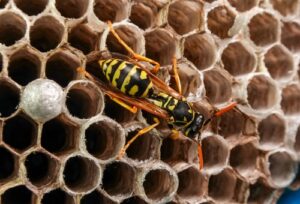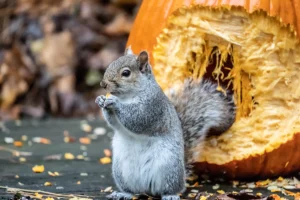Home / Blog / How to Get Rid of Wasps Around Your Pool
How to Get Rid of Wasps Around Your Pool

Scientifically reviewed by Daniel Baldwin, BCE, CCFS, CP-FS
-Published on March 24, 2023
-Updated on July 13, 2023
Swimming pools act as your private oasis all summer long, providing endless hours of relaxation and outdoor fun. But when wasps move in, your time around the pool can turn from delightful to disastrous. Fortunately, a few simple solutions can keep wasps away from your pool, letting you get back to enjoying the water.
Why do wasps fly around pools?
Wasps are naturally attracted to big, open sources of water. Because they have a hyperactive sense of smell, they tend to prefer bodies of water with strong odors. The chemicals typically used to treat pool water, such as chlorine, emit odors that wasps are often drawn towards.
Additionally, the bright colors and scents of common backyard flowers and grass can attract wasps. Meats, sugary drinks, and sweet-smelling fruits that you serve poolside will often capture the attention of wasps searching for a new food source.
How do I get rid of wasps around my pool?
Unfortunately, wasps can be tricky to get rid of, especially in expansive outdoor areas, making it hard to know what to do about wasps around your pool. Certain natural remedies can help prevent wasps around your pool, control where they spend their time or make areas of your yard less appealing. To keep wasps away from your pool areas, follow these tips:
- Use decoy nests: Because wasps are so territorial, they won’t make a nest in an area that already has an established nest. Crumble a large brown paper sack, then shape it into an imperfect oval. Twist the open end shut and hang it near your pool in an awning, overhang, or area where you’ve seen a wasp nest before.
- Make a sugary treat: To keep bees and wasps away from your pool, fill a shallow bowl with a mixture of water and sugar, syrup, or honey. Place it far from your pool area. Doing this can deter the wasps from spending time around your pool.
- Hang raw meat: Whenever you head out to the pool, hang a small piece of raw meat, such as beef or chicken, in another part of your yard. This trick will draw the wasps away from the pool. (Just don’t forget it’s there!)
- Make an alternate habitat: Intentionally create an area away from your pool that’s ideal for wasps. Flowers that feature white, purple, blue, and yellow attract many predatory insects. Sweet fennel and spearmint have flavorful nectar wasps love.
- Call Hawx Pest Control: Our pest control technicians can safely remove a wasps’ nest and address your wasp problem so you can enjoy your summer months outside.
Wasp pest control services
Keeping wasps away from your pool is easiest when you hire a professional pest control solution company like Hawx Pest Control. We offer individualized zone treatments around the perimeter of your yard to prevent wasps and keep your pool area safe and fun. Hawx uses a three-fold process plus high-quality tools and qualified technicians to create an environment that lets you get back to relaxing by the water all summer long. Call us today for a free estimate.
More About Wasps
Wasps are flying insects that are either predatory or parasitic, meaning they can attack their prey or feed off a host to survive. They have pincers in their mouthparts, and most varieties have stingers with barbs that easily detach. In stinging species, only females have a powerful sting, which releases venom. Adult wasps are attracted to sugary drinks, foods, or anything with a sweet, fruity smell, but they can also eat other pests like flies, aphids, and centipedes.
Wasps can be solitary or social. The most common backyard wasps are social, operating as a system with one or several queens, a few drones, and sterile workers. The queen starts a colony in the spring by building a small nest and laying eggs that hatch into workers. These workers enlarge a paperlike nest composed of chewed dry plant material, usually wood, mixed with saliva. Depending on the species, you can find nests in soil cavities, tree trunks, or hanging from leaves, branches, or the eaves of buildings.
What’s the difference between a wasp and a hornet?
All hornets are wasps, but not all wasps are hornets. A hornet is a specific type of wasp. Most of the hornets found in the United States are related to the yellow jacket — a well-known backyard pest. Hornets are typically larger than a standard yellow jacket wasp with duller colors and are usually far more aggressive than a typical wasp. If someone or something threatens their nest, they can become dangerous and produce a very painful sting.
Do wasps carry diseases?
Luckily, wasps are not known to carry or transmit any human diseases. The most concerning risk from wasps is if a person is allergic to their venom. Allergic reactions can range widely from swelling and redness to anaphylactic shock. In some cases, nausea and vomiting can occur.
Related Articles
Visit our blog to learn more.
→





